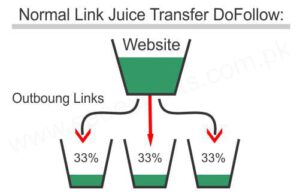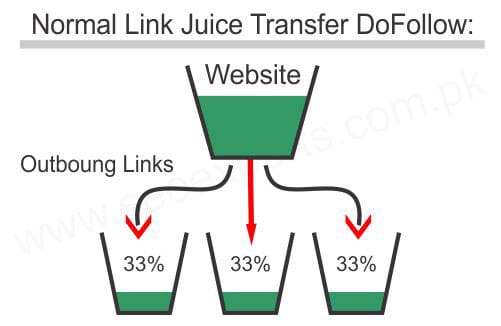Link Juice is a measure of value that can be passed between pages. It can be a crucial factor in increasing search engine rankings. However, there are several factors that affect how much link juice is passed. The links on a website must be of high quality to get the most juice.

The quality of your content is one of the most important factors when it comes to link juice. Without high-quality content, no amount of links or even the best keyword strategy will help your page rank higher. The reason for this is that the more relevant your content is, the better it will perform on search engine results pages. To improve your ranking, you need to focus on creating quality content that matches the needs of your target audience. The most effective way to do this is by creating long-form content.
Another factor that influences link juice is the type of backlinks. Dofollow links pass link juice to the page they lead to, while nofollow links do not. This is why it is so important to focus on getting dofollow links from authoritative websites. Dofollow links are important for a website’s SEO because they boost the page’s authority and increase its chances of being ranked in the top search engine results pages.
In addition to these external factors, the quality of internal links also plays an important role in determining link juice. When you have more quality internal links, your page will receive more PR and appear higher in search engine results pages. However, it is important to remember that the more links you have on a single page, the less PR will be passed to each of them. A high-quality page should have no more than 10 links on it.
While many marketers concentrate their efforts on obtaining high-quality backlinks, they often overlook pools of link juice that can be found within their own websites. It is a good idea to create a logical and well-structured site hierarchy that distributes link juice sensibly between your website pages.
You can think of a page’s link juice as a river with different streams that run through the site. The homepage is the main stream and receives most of the link juice, while other pages are like sidearms that benefit from the main stream’s flow and then pass it on to other sidearms. This helps keep the flow of link juice steady and increases its strength.
Relevancy
The relevance of a page is important because it can influence the amount of link juice that it passes on. A link from a highly relevant page will have more value than a link from an irrelevant page. This is why it’s a good idea to create relevant pages and include relevant keywords in your titles. This will help increase the value of your links and improve your ranking.
The content of a page is another factor that affects the amount of link juice it receives. Poor content cannot be hidden by a strong SEO strategy, and it is essential to ensure that your content is original and relevant. Moreover, the content should also be well-formatted and easy to read. This will help your webpages gain a better ranking on search engine results pages (SERPs).
In addition, the URL and anchor text of a page also play an important role in determining its PageRank. Using relevant keywords in the URL and anchor text will boost your page’s SEO performance and help you increase your PageRank. However, it’s important to note that these factors don’t necessarily have the same impact on a website’s PageRank.
A website’s PageRank is determined by the number of other websites that link to it and the number of links on those sites. The more quality links a site has, the higher its PageRank will be. However, a website’s PageRank can be artificially boosted through the use of spammy links or by purchasing fake links.
One of the most effective ways to boost a website’s PageRank is by generating relevant links from other websites. To do this, you should use targeted advertising and social media to promote your content and products. This will increase the visibility of your site and attract more qualified traffic, which can lead to higher rankings and greater prominence in Google’s SERPs.
Another way to boost page rank is by distributing link juice in a controlled manner. The best way to do this is by creating a clear site hierarchy and internal links that pass on link power sensibly.
PageRank
Page rank is a measure of the amount of authority a page has. It is determined by the number and quality of links that point to it. A high page rank is important for a website because it increases its visibility and can generate more traffic. In addition, it can also improve its search engine ranking. However, it is not the only factor that determines a site’s ranking. Other factors include relevance, keyword strategies, and social media marketing. A site can also increase its page rank through effective link-building strategies. These can include article marketing, guest posting, and press release distribution.
Link juice is passed from pages that have high page ranks to other pages within a website or blog. These pages are considered authoritative by Google and pass their equity to other pages that are linked to them. While there are a variety of ways to build links and boost PageRank, the most important one is to produce quality content. This includes writing original, relevant, and well-formatted content. It is also important to ensure that the content matches your niche and audience. Using a tool like keyword research can help you choose the right keywords for your website.
A page’s PageRank can be shared by many internal and external links, but only a few of these links will actually pass link juice to other pages. The rest will be absorbed by the page itself or ignored altogether. To maximize the amount of PageRank that passes to other pages, you should limit the number of outgoing links on a page and use the rel=”nofollow” attribute for unnecessary or unimportant links.
The position of a link on the source page also influences its value. Those that are located in the main body of the text are considered more valuable than those in the footer or sidebar. In addition, linking to pages with the same anchor text passes more link juice than linking to different pages with the same keyword.
Several tactics have been developed by SEOs to distribute PageRank among internal and external links. Some of these tactics have been controversial, but most have proven to be successful in improving page rank and boosting page rankings.
Internal links
Internal links are an important part of your website’s architecture. These links help Google and users navigate through your site. They also help spread link juice throughout your site. However, not all internal links are created equal. Some pages pass more link juice than others, and it’s important to know which pages are receiving the most juice from your site.
When choosing a page to link to, it’s important to think about its content. The more relevant the content is to your topic, the more link juice it will pass on. This will make it more likely that your link will be clicked, resulting in a higher search engine ranking.
Another factor to consider is the authority of the page you’re linking to. A highly authoritative page will pass more link juice than a low-authority page. In addition, the more outbound links a page has, the less link juice it will pass on to other pages.
One way to increase the amount of link juice a page receives is by building external links. This will improve the visibility and ranking of the page as well as its domain authority. However, this method is time-consuming and requires a lot of work. Therefore, it’s best to use this method only for high-value pages.
To build valuable internal links, you can use a variety of tools and techniques. For example, you can use anchor text to link to pages with related topics. You can also use keyword research to find out what words people are searching for. This will help you choose appropriate keywords for your links. However, it’s important to note that too many internal links can hurt your search engine rankings. If you’re not careful, your internal links may end up being “dead” and won’t be indexed by Google. To avoid this, you can set up 301 redirects to send traffic from dead URLs to other pages on your site. This will prevent your site from being penalized by Google. You should also avoid using automated internal link building tools, which can cause spam and harm your SEO efforts.
